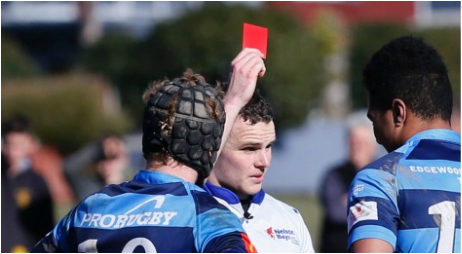 Photo Credit: Photo Credit: College Sport Media tells the story of successful young people. Behind individual team and individual sporting success are the coaches, parents and support staff – and the officials - the referees and umpires that help make a well-run game possible. As the winter sports season gets underway in earnest, College Sport Media went to New Zealand Rugby (NZR) to ask about the health of the game from the standpoint of the referees. How are referee numbers shaping up? Pretty good actually, says NZR Community Rugby Manager Brent Anderson, who shone a positive insight on referees numbers, as well as some other issues that we put to him. Our questions and his answers below: College Sport Media (CSM): NZR already has initiatives such as You Make the Call, that give students the chance to gain credits for refereeing, referee recruitment incentivised in School Rugby Administrator agreements, and school coaches encouraged to do associate referee courses. Despite these positive steps we still see a decline in numbers refereeing. Is there anything else being done to address referee shortages Nationwide? Brent Anderson (BA): Our national numbers remain relatively consistent from year to year. Although there was a small decline of 1.2% in 2015 this change is consistent with similar fluctuations up and down over recent years. Trends in the provinces are similar with minor fluctuations up and down. This year we have invested in a comprehensive social media recruitment campaign to encourage men and women who love rugby to take up refereeing. Some Provincial Unions (PUs) also undertake their own recruitment campaigns. At a national level we also put our resources into providing comprehensive development programmes for both referees and coaches so that they have the skills they need to be involved, and stay involved, in the game. CSM: Is a shortage of referees impacting player retention or preventing young players staying in the game and continuing to play rugby later into their secondary schooling and beyond into club rugby? BA: Our focus is always player enjoyment. If players enjoy their rugby experience they will continue to play. Good referees and coaches play a major role in that. That’s why we put a lot of our resources into producing good referees and coaches. CSM: Most regions have a separate body that runs referees. Does this body limit NZR's ability to implement meaningful change quickly? BA: No, not at all. NZR has agreements with all of our PUs to run education programmes for referees. That means any changes or updates that need to be made are easily implemented and relayed to all referees. CSM: Other school sports all pay their referees - why has rugby not gone down the same track, especially as schools seem happy to pay to ensure kids play? BA: One of the core values of community rugby is we are an amateur game and we cherish that value. We provide our referees (through the PUs) with kit and the resources they will need as well as extensive training and education free of charge. A significant number of Provincial Unions reimburse their referees for their expenses at the end of the season. CSM: Is the issue of referee abuse, mainly by players, but also by supporters, any more or less of a problem than its always been, and does this or the perception of it hinder referee recruitment? BA: Any incident of referee abuse is a concern for us. Respect is another of community rugby’s values and that means respect for the other team, teammates and the referee. We have seen a slight decrease in the number of reported incidents of referee abuse which is a positive sign. Our APPLAUD programme is used by clubs and PUs all over New Zealand and every year the uptake of it grows. Our research shows that the main reasons referees stop refereeing are work, family and other hobby related. CSM: The female game is growing, are there comparable female referees taking up the whistle to match growth in player numbers? The numbers of female rugby players continue to grow and we need to have the number of referees and coaches to support the numbers – be they male or female. More women are showing an interest in refereeing and we are developing pathways for them to become referees and develop their skills further. |
Archives
October 2023
Categories |
OrganisationCollege Sport Media is dedicated to telling the story of successful young sportspeople in New Zealand
|

 RSS Feed
RSS Feed